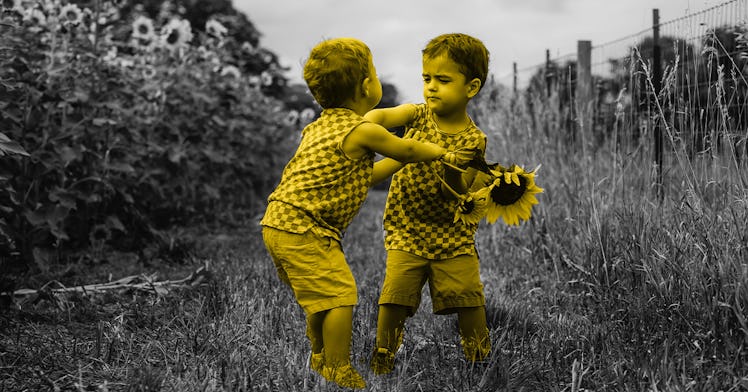How to Gently Stop a Toddler From Hitting
There are steps to stop a toddler from hitting but they may just grow out of it too

An aggressive toddler who hits others out of anger can be particularly concerning for parents. Preschoolers are meant to be precious angels, not fierce and ferocious. So some parents, who don’t understand how to keep a toddler from hitting, might over-correct and become harsh and aggressive themselves. But that’s the wrong tactic. Harsh discipline can increase what child psychologists call “externalized behaviors” like hitting, kicking, yelling and biting. To really keep a toddler from hitting, parents need to double down on kindness and help their child practice acceptable ways of expressing their anger.
Start with Values
The foundation of any discipline, whether it be for an aggressive toddler that hits or any other kid, should be a set of well-established and well-communicated values. When a family operates from a foundation of prosocial, positive values it becomes easier to make and enforce rules.
If non-violence and peaceful resolution is a value for your family, it should be practiced by every member of the family. And the rules connected to that value you should be clearly stated: “We don’t hit,” or “We don’t hurt others” will suffice.
Model the Behavior You want to See
Children look to parents for clues about how to live in the world. That’s how they learn. So parents who want to stop a toddler from hitting should make sure that they aren’t hitting either.
The best way to help a child learn more appropriate ways to deal with their anger is to model that behavior yourself. That might mean taking deep breaths when you’re frustrated, giving yourself a time-out to cool down, or simply expressing your frustration verbally, in a calm manner.
Praise Non-Violent Reactions
The American Academy of Pediatrics guide to aggressive toddler behavior suggests parents praise the opposite appropriate behavior when it’s noticed. That sounds like a tall order but you might be surprised how often a child reacts appropriately. After all, the loud behavior has a tendency to draw more attention. When you look for the good, you tend to find it.
When you notice your toddler dealing with frustration in an appropriate way, make sure you praise them immediately. Also, make it clear what you’re praising them for: “I really like the way you calmed down!”
Give Immediate Feedback and Redirect
When you see a toddler hit, you should say “no” right away and offer an appropriate activity. If a toddler hits, give them something else to do with their hands. If the bite, give them something appropriate to bite on.
You can offer a calm and to-the-point explanation (“That hurts!”), but it’s not the time for in-depth attempts at reasoning. Toddlers don’t learn by being told. They learn by watching and doing.
Practice
Dr. Larry Kazdin of the Yale Parenting Center places practice at the center of his behavioral interventions for toddlers. He notes that the concept is similar to giving pilots time in a flight simulator — you don’t expect to tell someone how to fly and then expect them to hope in the cockpit and do it right the first time.
Parents can help kids make a habit of the appropriate reactions through practice. Role play a scenario in which your child might hit out of anger. But instead of hitting, offer them a more appropriate reaction that you can live with — maybe a mean look, a stomped foot, or some slow breaths. Make time to practice several times a week until it becomes second nature.
Know When to Call a Professional
In rare circumstances, parental intervention may not be enough to help a child deal with their anger. If a child’s anger is disrupting their ability to learn or live a happy life, it’s possible that there are deeper issues to consider. Warning signs may include complaints about aggressive toddler behavior from teachers, or other parents.
Talking to a pediatrician will help parents understand if their child’s behavior is linked to developmental delays or other childhood health issues. In the worst circumstances there are likely to be treatment options that will help a toddler live a more fulfilling and happy life.
Give Them the Benefit of the Doubt
It’s hard being a toddler. First, they simply haven’t developed the brain structures that allow for self control. Second, everything is ripe for exploration but mobility is limited. Finally, there’s so much to express but vocabularies and communication abilities are still developing.
Parents would do well to have some empathy. Your toddler isn’t hitting because they are a bad kid. They are hitting because they are toddlers. And as they develop better ways to express themselves the hitting will probably stop.